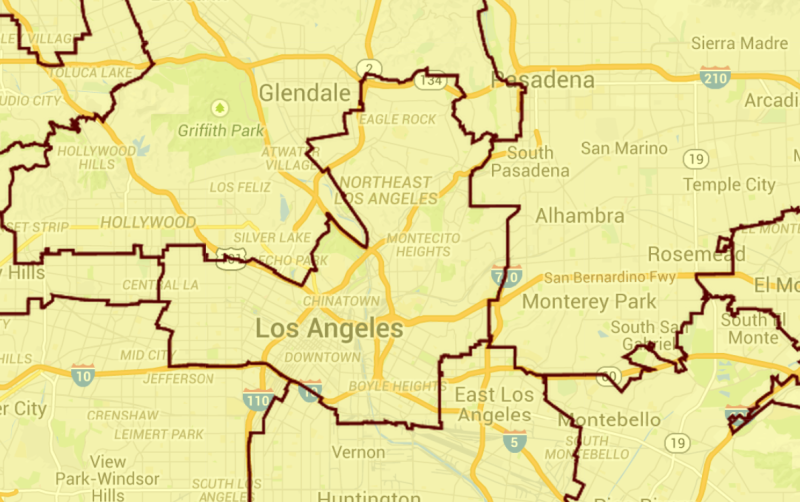Californians Speak Out
Now, a swarm of Californians are filing amici curiae briefs on behalf of the Arizona Independent Redistricting Commission, clearly fearing that the fate of the California Citizens Redistricting Commission depends on what happens in Washington, D.C., before the end of 2015.
While California's commissioners have filed their own amicus brief in support of the Arizona panel, their fight was joined on Friday by a similar brief from three former California governors -- George Deukmejian, Pete Wilson and Arnold Schwarzenegger. Of those, Schwarzenegger has the most to lose in terms of his legacy, as he was a driving force behind the two initiatives that wrestled control of political map drawing away from the Legislature.
The governors were joined in their filing by the California Chamber of Commerce as well as wealthy activists Charles Munger Jr. and Bill Mundell -- two big money backers of the redistricting initiatives.
It's fascinating that the California cavalry is rushing in to defend its Arizona compatriots now, given that this effort to kill Arizona's redistricting commission is pretty much down to its last swing of the bat. A U.S. District Court ruled against Arizona's legislative leaders last February, and it's not exactly clear that the Supreme Court justices will even consider all of the arguments made by legislators seeking to regain their redistricting power. Perhaps, but everyone still sees the stakes as high.
"The Arizona litigation," said California Chamber of Commerce President Allan Zaremberg, "jeopardizes the will of the California electorate and its embrace of fair redistricting and competitive elections."
Who Can 'Legislate'?
For the average observer, the crux of the case may be this: Is the power of Arizona voters to write legislation -- legislation written through the ballot initiative process -- equivalent to the legislative power over elections in Article I, Section IV of the Constitution:
The times, places and manner of holding elections for Senators and Representatives, shall be prescribed in each state by the legislature thereof; but the Congress may at any time by law make or alter such regulations, except as to the places of choosing Senators.
Arizona's legislative leaders say, quite simply: no way. In their December filing with the U.S. Supreme Court, they argue the above passage is crystal clear:
"The term 'the Legislature' is clear and explicit and has an unambiguous meaning repeatedly recognized by the Framers and this Court: the representative lawmaking body of a State. In the Constitution, the Framers carefully assigned particular obligations to particular State-level entities, whether the 'people,' the 'legislature,' the 'executive,' or the 'State' generally. That precise division of labor leaves no doubt that they intended that 'the Legislature' -- meaning the representative lawmaking body -- be the entity that 'prescribe[s]...Regulations governing redistricting."
It's worth noting that Arizona's independent redistricting commission is selected by a different process than the one in California, though Golden State activists and lawmakers may have used parts of the Arizona process to help shape the final details that were drafted in 2007.
In Arizona, the independent commission has five members. Four of them are chosen by the state's legislative leaders from a pool vetted by a judicial commission; the chairperson of the commission is then selected (out of the remaining applicants) by the four commissioners.
In California, the panel is 14 members. Eight commissioners are chosen at random, from a pool of applicants vetted by the state auditor but from which each of the four legislative leaders is able to reject six names. Those eight commissioners then choose six colleagues from the remaining applicants.
If Arizona's System Is Struck Down ...
From a layman's perspective, if Arizona legislators are successful in convincing the Supreme Court that they been stripped of their right to have a role in crafting congressional maps -- even though the Arizona system allows top lawmakers to pick four-fifths of the commission -- then it would seem much easier for California's legislators, who have a much smaller role, to argue they, too, have been wronged. Remember, the entire political campaign was about stripping politicians of their power to draw congressional districts.
(And in case you're confused, the pending Supreme Court case is only about drawing congressional districts, not those for Arizona's Legislature.)
Most states across the nation continue to have their political maps drawn by legislators -- a power that's led to countless charges of districts skewed by gerrymandering for partisan gain. And that's what supporters of independent redistricting say will happen again if the high court strips the Arizona commission of its power to craft the state's nine congressional districts.
"The Arizona Legislature's lawsuit is just an effort to get the foxes back in the henhouse," said Kathay Feng, executive director of California Common Cause and one of the authors of the California redistricting laws.
In California, a redistricting process dominated by majority Democrats in the Legislature would undoubtedly produce more Democrats and fewer Republicans in the state's congressional delegation, though leaders of both parties in the state Capitol opted for a map that protected incumbents in 2001, the final once-in-a-decade redrawing before the independent commission took over.
Even some members of Congress don't want to go back.
